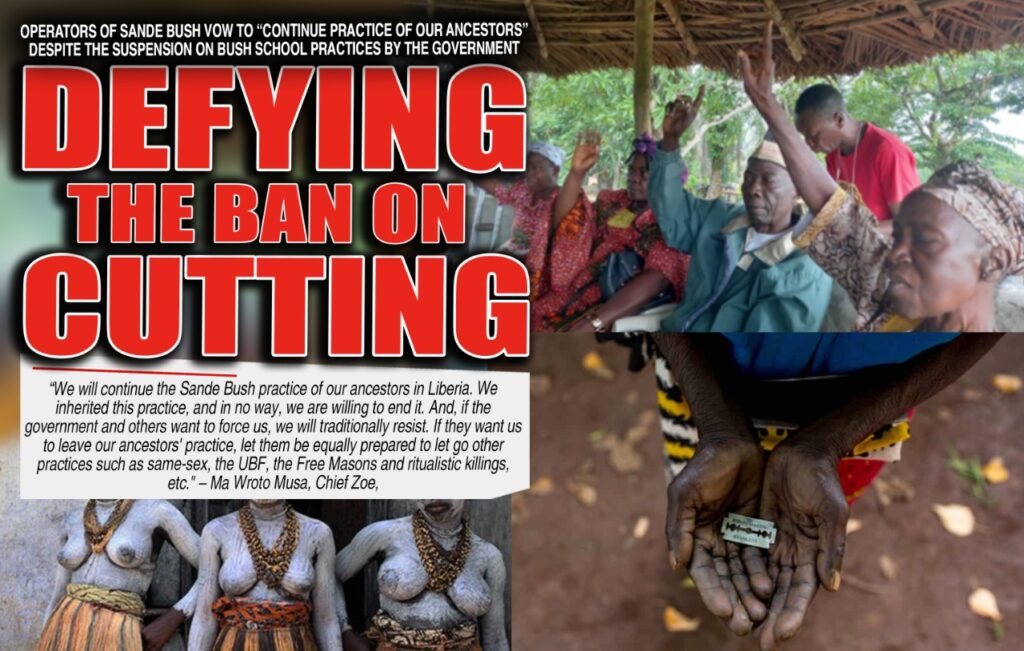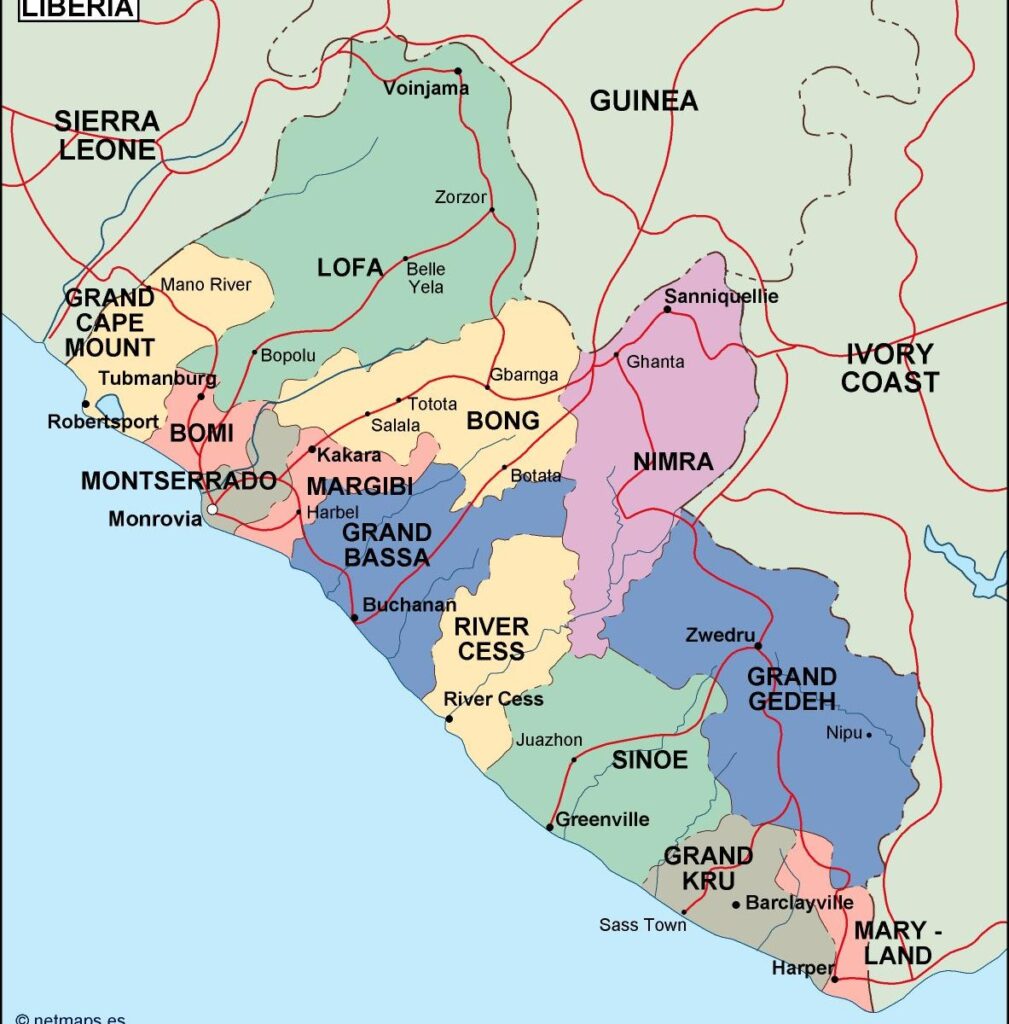The following article contains two interesting aspects to which I would like to draw the readers’ attention.
First, I was struck by the public declaration of Chief Zoe, Ma Wrote Musa, to continue certain traditional practices of the ancestors, including the practicing of FGM, female genital mutilation. My interpretation of these remarks is that traditional values and behavior are still undisputed in Liberia, at least at the highest level.
Secondly, almost causal the Chief Zoe mentions ritual killings. Shocking, it’s a public acknowledgement that these age-old practices still occur in this West African country. I found it shocking – which it is not really, in the sense that everyone in Liberia knows of the existence of these crimes, based on greed, superstition and the disrespect of the rule of law and of the human rights of the victims – including the government. (FVDK)
Liberia: “We’ll Continue the Sande Bush Practice of Our Ancestors” – Zoes in Margibi Vow
“We will continue the Sande Bush practice of our ancestors in Liberia. We inherited this practice, and in no way, we are willing to end it. And, if the government and others want to force us, we will traditionally resist. If they want us to leave our ancestors’ practice, let them be equally prepared to let go other practices such as same-sex, the UBF, the Free Masons and ritualistic killings, etc,” said Chief Zoe, Ma Wroto Musa.

Published: August 30, 2022
By: Mae Azango – Front Page Africa
MONROVIA – Hundreds of Liberian school-aged girls and young women stand the risks of being initiated into the Sande Society, also known as the bush school, because, traditional leaders of Margibi County pledged to continue their ancestors’ traditional heritage.
Chief Zoe, Ma Wroto Musa, Chief Samuel Kollie and other traditional leaders in Weala Margibi County vowed to continue Sande activities admit the three-year suspension on the practice.
“We will continue the Sande Bush practice of our ancestors in Liberia. We inherited this practice, and in no way, we are willing to end it. And, if the government and others want to force us, we will traditionally resist. If they want us to leave our ancestors’ practice, let them be equally prepared to let go other practices such as same-sex, the UBF, the Free Masons and ritualistic killings, etc,” said Chief Zoe, Ma Wroto Musa.
Speaking in Weala Margibi County, during a recent town hall in meeting, organized by HeForShe Crusaders Liberia, the West Point Women for Health and Development Organization and Community Healthcare Initiative, the zoes, along with over 20 traditional leaders, said even though they are knowledgeable of the three years suspension on FGM activity in Liberia, but they will continue until same-sex and UBF is abolished as well.
During the ongoing dialogue, in affirmation of their support, all the invited traditional participants raised their hands in support of FGM continuation in Liberia.
The Ministry of Internal Affairs, which is the umbrella entity responsible for regulations of all traditional affairs, is unaware of the violation by many traditional leaders. When contacted regarding the wave of FGM activities going on after the three-year ban placed on the practice, Assistant Minister for Culture and Customs, Joseph B. Jangar, said he is surprised and shock at the same time such activities but promised to follow up with superintendents of the various counties that are said to be violating the three-year moratorium.
“The zoes and traditional leaders are all aware of the three-year suspension and not one of those zoes operating the bush schools will be able to show you any certificate from the Ministry of Internal Affairs because we are aware of the ban,” said Minister Jangar.
It can be recalled that in late February 2022, Chief Zanzan Karwor, Chairman of the National Traditional Council of Liberia, announced a three-year suspension of the practice of female genital mutilation in Liberia. The three-year ban which started with immediate effect came amidst campaigns by human rights groups for a total ban on the practice. But it seems since the declaration was made, many traditional leaders are openly violating the ban.
“FGM/C is not only a human rights violation, but undermines the peace and security of each and every female. Access to bodily autonomy is a right to every woman, end FGM and its not cultural but harmful suppression,” Saye Tamba F. Johnson, National HeForShe Crusaders Liberia. Johnson said Margibi County is the second county that has challenged the three-year suspension of FGM. The first was Grand Cape Mount in February of 2022. However, Lofa, Gborpolu, Grand Bassa, Bong, Montesrrado and Rivercess Counties are reportedly still carrying out the act, too.
According to this newspaper’s Nimba County Correspondent, two zoes in that county paid dearly for disobedience to the three-year ban when they were arrested in Sanniquellie, Nimba County, for forcing over 8000 school-going aged girls into the Sande Bush. The girls, who had gone to prepare for 2022/2023 school year, were all captured and forced into the Bush School by the two traditional leaders. And the report added that the practices are presently taking place in the 19 administrative districts in Nimba County.
HeForShe Crusaders Liberia, Lofa County Coordinator Boakai Yamah reported on the increase of FGM activities and listed towns and villages that are carrying out the practice during the three-year suspension.
“I reported earlier from Lofa County, on the increase in the numbers of Sande Bushes in operation across the county. Here are the names and locations where Sande Bush activities are ongoing.
1. Gbordu Town, Kpalakollie Clan, Tangia Administrative District, Foya
2. Lawalazu Town, Lower Workor Clan, Voinjama District
3. Zawoadamai Town, Lower Workor Clan, Voinjama District
4. Borgondu Town, Quardu Gboni District
5. Korlelar Town, Quardu Gboni District
6. Kamolahun Town, Ngolahun Clan, Lukambeh District
7. Manena Town, Hembeh Clan, Lukambeh District
8. Lehuma Town, Wanwoma Clan, Wanhassa District.
However, for Lehunma Town all preparations have been put in place to take the children,” concluded Coordinator Yamah. Back to the Weala Meeting in Margibi, following the intense awareness on the importance of maintaining all positive attributes of the Sande Bush, making away with the circumcision aspect, the leaders and supporters disagreed. “Our leaders at the national level are seeking money and forgetting the values of our heritage. They are seeking their own personal interest and not us. They don’t consult us on issues; we only hear about them, which is a disservice to us. Hence, there is a need for you all to keep engaging us and let us know who are directly involved with the bush and speak out on what is possible,” said Chief Samuel Kollie.
Source:
Liberia: “We’ll Continue the Sande Bush Practice of Our Ancestors” – Zoes in Margibi Vow

